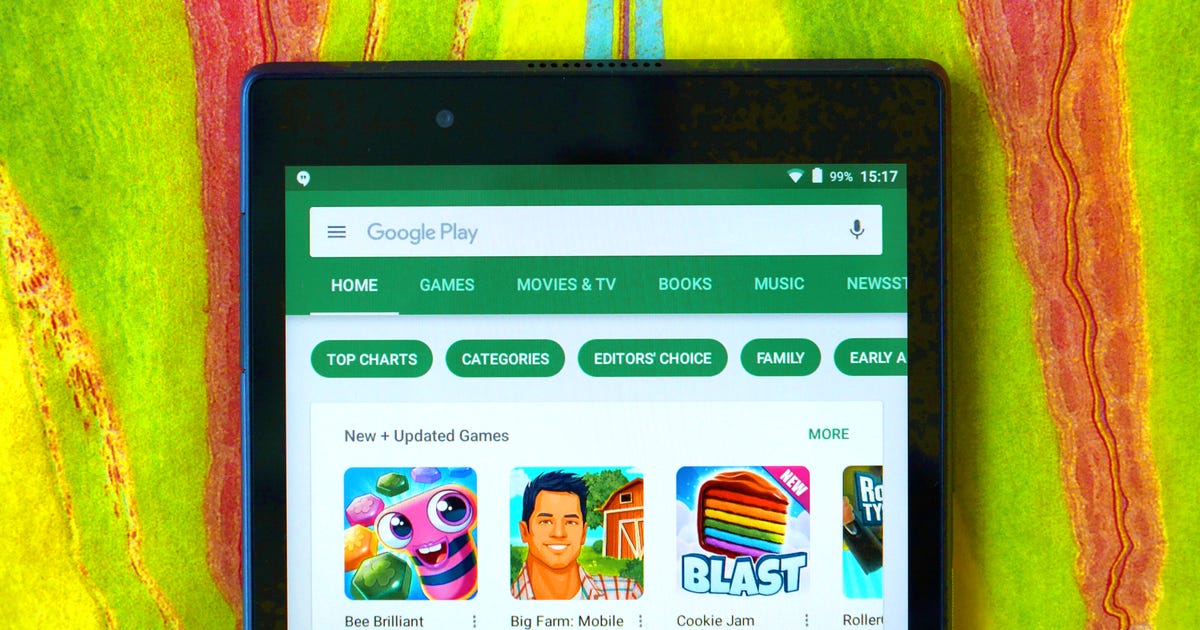Google Loosens Its Stranglehold on In-App Payments, Starting With Spotify

Google Loosens Its Stranglehold on In-App Payments, Starting With Spotify
What's happening
Google and Spotify struck a deal that allows subscribers to use the streaming service's payment system, a major break in the way app stores have run.
Why it matters
If Google expands the program, developers and users could have more control over how payments inside mobile apps are made, potentially making transactions cheaper.
Google struck a landmark deal that will let Spotify offer its own in-app payment option alongside Google's Android billing system, a move the search giant has resisted for years.
While the change may seem minor, it could prove to be a major crack in the fortresses that Google -- and Apple -- have built around their massive mobile-app economies since laying the foundations for them more than a decade ago.
The effect on consumers like you may be very small at first: A segment of Android users who want to subscribe to Spotify will be able to sign up more simply in its app and have a new choice in how to pay. But the change, if adopted more widely, would not only give you more control over how you pay for transactions in mobile apps. It also could disrupt dynamics that in some cases have made your in-app purchases more expensive and in other cases removed the option of an in-app purchase altogether.
"This is a significant milestone and the first on any major app store -- whether on mobile, desktop or game consoles," Sameer Samat, Google's vice president of product management, said in a blog post to developers. The option to use third-party payment will be rolled out more broadly in the future, he said.
Spotify, in its own blog post, said that it will be able to offer its own billing option side by side with Android's in its mobile app, adding that it will also be able to "freely communicate" about discounts and promotions in the app. Previously, Spotify didn't allow listeners to subscribe to its premium membership in its Android app at all; its Apple mobile app doesn't offer subscriptions, either. Spotify had pulled out of in-app payments entirely over its objections to fees and restrictions set by Google and Apple.
Google had already begun allowing app developers to offer alternative payment systems in South Korea after a law was passed there. Now it's expanding worldwide. Because of security concerns, Google said it's starting with Spotify, which is the world's biggest streaming music service, with more than 400 million listeners, and other trusted partners.
The move comes after years of resistance to third-party payment on Google Play and represents a major change in the way platform owners manage their software marketplaces. Google, along with Apple, controlled payment systems in order to ensure a cut, usually between 15% and 30%, depending on a few factors. The standard practice of forcing all mobile transactions through Google's or Apple's payment systems reduces income for developers. App stores like Google Play have been the subject of alleged monopolistic practices by lawmakers and regulators, both in the US and abroad.
In one major case, Google fought Epic Games, the maker of the hit battle royal game Fortnite, over payments outside the Play Store. As soon as Epic Games started allowing players to buy in-game purchases outside the Play Store, Google kicked the popular title off its marketplace. As of publishing, Fortnite is still unavailable on the Play Store, but can be downloaded and installed externally, similar to how a program is installed on a computer.
In October of last year, Google filed a counterclaim stating that Epic Games owed Google relief for allowing users to download Fortnite through the Play Store but use Epic's payment system instead. Google and Epic Games have agreed to a trial in early 2023.
Google's shift on payment policies follows last year's verdict in a trial between Epic and Apple. The ruling required Apple to allow app developers to inform consumers that they can go outside of the App Store to make payments for items or subscriptions bought within apps. However, developers can't provide a button linking customers to an alternate payment system.
Google's program with Spotify will give some Android users more control over how they pay for the music-streaming service. While the exact terms of the deal are unknown, it could allow Spotify to promote certain deals or pass on savings to customers now that Google is offering alternative payment methods.
Spotify has frequently criticized Apple as abusing the might of its App Store, including billing-system restrictions. Spotify has said that Apple has retaliated when it tried to circumvent Apple's payment system by rejecting its mobile-app updates.
Apple has rejected charges that its App Store is anticompetitive, though the EU has found the company's in-app payment practices violate competition law. Apple didn't immediately respond to a request for comment for this story.
Google does allow some alternative payment platforms to be used with Android. The Samsung Galaxy Store and the Amazon Appstore are two prominent examples in the US. The Huawei App Market Store and Tencent My App Store are examples in China.
Correction, March 24: An earlier version of this article misstated the start of the pilot program in South Korea. Third-party payments were already available in the country.
Source
